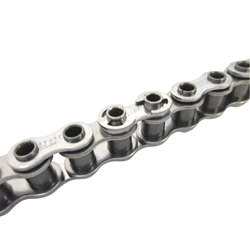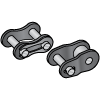(!)NOTE : Windows 7 users won’t be able to use some latest features of eCatalog/WOS since Microsoft is ending support for Windows 7 on 14 Jan, 2020. Please upgrade your system for uninterrupted services.
- Notice of End of Sales for Economy Series Pneumatic Equipment Category. More information.
Roller Chains(Nominal Number:50HP-SUS)
|
Type
|
|
|---|---|
Brand |
|
| CAD |
|
| Days to Ship |
|
1 items
- Sort By
-
You can add up to 6 items per a category to the compare list.

Stainless Steel Hollow Pin Chain
KATAYAMA CHAIN
Hollow pin chains are chains connected by hollow pins. The attachment is easy to install because the pin is hollow. Equal to JIS standards and nibai pitch roller chain standards
[Features]
· Hollow pin chains are chains connected by hollow pins.
· Attachment is easy to install because the pin is hollow.
· Hollow pin chain is JIS standard, identical to standard roller chain and nibai pitch roller chain, and so use standard product sprocket.Type Nominal Number Pitch Number of Strands Material Surface Treatment Max. Allowable Tension(kN) Environment Standard Chains 50HP-SUS - - Stainless Steel - - - From: ₹ 519.25 Days to Ship: 10 Day(s) or more  10 Day(s) or more
10 Day(s) or more
| Brand |
|---|
| Product Series |
| CAD |
| From |
| Days to Ship |
| Type |
| Nominal Number |
| Pitch |
| Number of Strands |
| Material |
| Surface Treatment |
| Max. Allowable Tension(kN) |
| Environment |
You can add up to 6 items per a category to the compare list. | |
| Brand | KATAYAMA CHAIN |
| Product Series | |
| CAD |
|
| From | ₹ 519.25 |
| Days to Ship | 10 Day(s) or more |
| Type | Standard Chains |
| Nominal Number | 50HP-SUS |
| Pitch | - |
| Number of Strands | - |
| Material | Stainless Steel |
| Surface Treatment | - |
| Max. Allowable Tension(kN) | - |
| Environment | - |
Loading...
Configure
Specification/Dimensions
-
Nominal Number
- 06B
- 08B
- 10B
- 11
- 12B
- 15
- 16B
- 20B
- 25
- 25-N
- 25-SUS
- 35
- 35-N
- 35-SUS
- 40
- 40-N
- 40-SUS
- 40F
- 40F-SUS
- 40H
- 40HP
- 40HP-SUS
- 40NL
- 40SB
- KANA40-SUS
- TYC40
- 50
- 50-N
- 50-SUS
- 50F
- 50F-SUS
- 50H
- 50HP
- 50HP-SUS
- 50NL
- 50SB
- KANA50-SUS
- TYC50
- 60
- 60-SUS
- 60F
- 60F-SUS
- 60H
- 60HP
- 60HP-SUS
- 60NL
- 60SB
- KANA60-SUS
- TYC60
- 80
- 80-RPSUS
- 80F
- 80H
- 80NL
- KANA80-SUS
- TYC80
- 100
- 100F
- 100H
- 120
- 140
- 160
- 200
- 410
- 415
- 415S
- 420
- C2040HP
- C2040HP-SUS
- C2050HP
- C2050HP-SUS
- C2060HP
- C2060HP-SUS
-
Pitch
-
Number of Strands
- 1
- 2
-
Material
- Steel
- Stainless Steel
-
Surface Treatment
- Special Anti-corrosion Treatment
- Not Provided
-
Max. Allowable Tension(kN)
- ~99
- 100~499
-
Environment
Related Categories to Roller Chains
FAQ Roller Chains
- Question: How can I determine the right Roller Chains size and type for my application?
- Answer: To determine the right Roller Chains size and type for your application, you need to consider factors such as load capacity, operating conditions, speed, and type of motion required. It is essential to consult the manufacturer's specifications and guidelines to ensure that the Roller Chains meets your application's requirements.
- Question: How do I maintain and prolong the lifespan of my Roller Chains?
- Answer: Maintaining and prolonging the lifespan of your Roller Chains involves regular inspection and lubrication. You should inspect your chains regularly for signs of wear or damage, and address any issues promptly to prevent further damage to the chain or equipment. Lubrication is also critical to reduce friction and wear on the chain, and you should use the appropriate lubricant according to the manufacturer's specifications.
- Question: Roller chain is making noise. What could be wrong?
- Answer: Several factors can cause noisy chain operations, such as:
- Lack of lubrication
- Excessive wear on chain or sprockets
- Improper chain tension - Question: What variety of materials does Roller Chains products offer for its chains, and how do these materials cater to different applications and user preferences?
- Answer: Roller Chains Products offer a range of materials for its chains, including steel, stainless steel, plastic, and specialized materials for high-temperature or corrosive environments. Each material has its unique properties and advantages that cater to different applications and user preferences. For instance, stainless steel chains offer superior corrosion resistance, while plastic chains are lightweight and provide excellent chemical resistance.
- Question: What types of surface treatments does Roller Chains Products have and how different?
- Answer: Roller Chains Products offer a variety of surface treatments for its chains, including coatings, plating, and heat treatment. These treatments provide additional protection against corrosion, wear, and other types of damage. Some common surface treatments include nickel plating, zinc plating, and black oxide coating. The choice of surface treatment depends on the specific application and user requirements.









How can we improve?
How can we improve?
Thank you for your time.
Your feedback is essential for our continuous improvement
Privacy Policy
Thank you for your cooperation.
Thank you for your time.
Your feedback is essential for our continuous improvement
Please use the inquiry form.
Privacy Policy